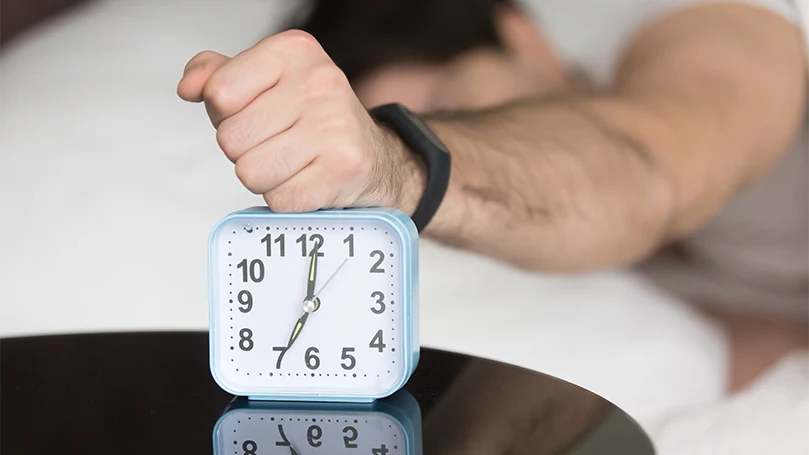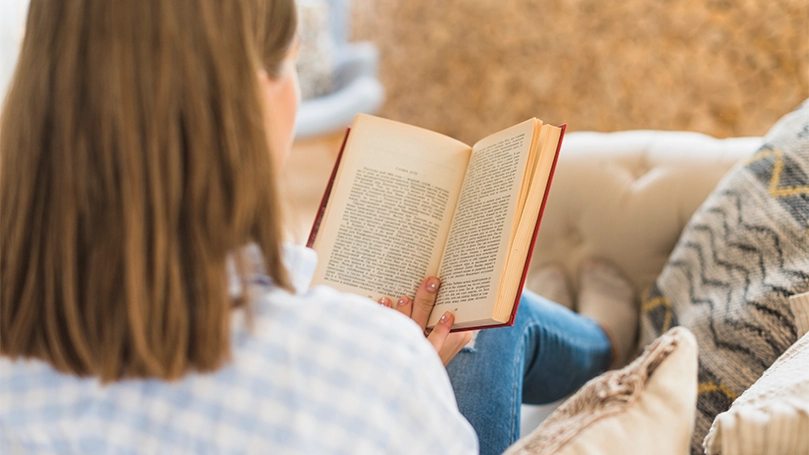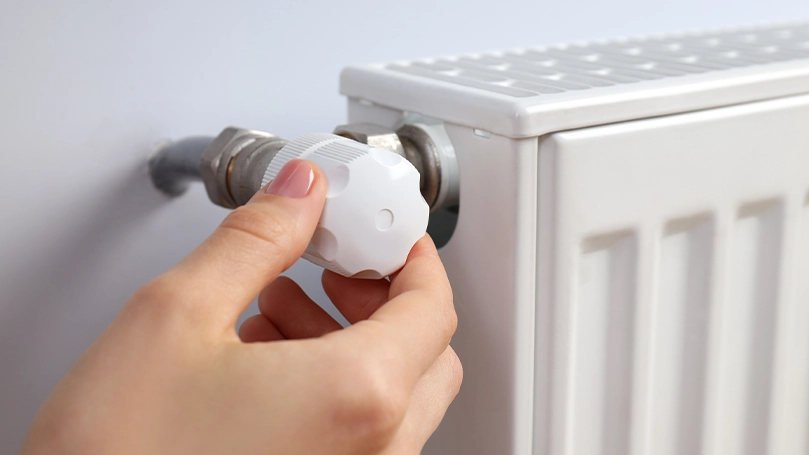What NOT to do before bedtime
To start things off, we'd like to discuss all the general pitfalls that can hamper your ability to fall asleep. Some of these are easy to spot as a bad nightly bedtime routine but others are a bit trickier. So, let's go through all of them!
Use electronic devices

Of all the things to do before bed, using electronic devices is among the worst. So, drop that phone, or tablet, and close that laptop. You don’t need them before bed, nor are they healthy. Disconnect from work, stop checking your emails before bed and put your phone in a drawer. That also applies to social media and video games. Although they are a great pastime, you will not get enough rest if you do that immediately before bed.
The reason why gadgets are a big no-no before bed doesn’t only lie in the fact that they will keep your mind preoccupied long after you’re in bed. Computer, tablet and smartphone screens also emit blue light. That is a light that has a similar wavelength to sunlight and suppresses the production of melatonin.
And melatonin production is essential if you want to promote sleep. This is because it “signals” our body when it's time to go to bed, via our inner clock or circadian rhythm. Therefore, exposure to screens with blue light can make you feel less sleepy, and consequently give you insomnia.
Have a bedtime snack
Although snacks usually represent a nice dopamine boost, they can make falling asleep quite a battle. In fact, we have an entire article dedicated to which foods can ruin your sleep and which ones can actually help.
But here's the TL;DR – avoid spicy food, high-protein food, fat, and junk food in general. All of these foods can make you feel restless. You will be tossing and turning because your metabolism will still be working on digesting your food, and you may even experience acid reflux or heartburn.
All of these factors can affect sleep and you should avoid them at all costs. Of course, it goes without saying that alcohol, energy drinks and caffeinated drinks will kill all your will to sleep as well. However, it's not all doom and gloom. If you’re a tea fan, jasmine tea or chamomile tea should be your top picks. As for snacks, try a light turkey sandwich, some oats (without dry fruit), or cherries.
Exercise
Although exercise is generally an incredibly healthy thing to do, it loses its status among healthy sleep habits when done right before bed. Just like with the previous segment, there's a lot to discuss when it comes to evening exercise and its effect on sleep but here are the main points.
Jumping into bed right after a workout can make it difficult to fall asleep. That's because your body is still full of adrenaline and your core body temperature is higher than it should be. Mind you, this isn't to say that you should avoid working out altogether. It's rather that you should leave at least 1/2 hours of rest between the gym and your bed.
So, if you experienced difficulty falling asleep and you usually go to bed right after working out, this is the place to start when it comes to optimising your night routine.
Go to bed/wake up at different times

For some people, maintaining a consistent sleep schedule probably sounds like quite a hassle. And it makes sense, as most of us want to stay up a bit longer and/or sleep a little more once the weekend rolls around.
However, a good, consistent sleep schedule is invaluable when it comes to improving your sleep quality. In fact, it can even help with certain sleep problems and sleep disorders (like insomnia). And all of this is because it helps your body form a rhythm when it comes to your wake-sleep cycle, knowing exactly when it needs to secrete sleep hormones and when to wake you up.
So, you need to determine the right time when you should go to bed and get up. A general rule of thumb is to go to sleep seven and a half hours before you need to get up. However, there are other cool methods you can try. For example, there are plenty of apps that determine the optimal time to wake up by calculating sleep cycles.
For example, if you need to get up at 8 AM, the calculator will say that you will get optimal sleep time if you fall asleep at these times: 10:45 PM, 12:15 AM, 1:45 AM, 3:15 AM, 4:45 AM, and 6:15 AM. The latter times are definitely going to be harder to manage… However, if it happens… scientifically, you should be able to wake up with more ease at that time, than any other.
But do whatever works for you! Sleeping habits mean nothing if you don't practice them every night, so, try to work out the most optimal setup for your life and stick to it!
Some of the best sleep routines
Now that we've covered all the main pitfalls, it's time to put a positive twist on things! So, we're going to detail what a healthy routine that's likely going to improve your sleep quality should look like!
Reading

For book lovers, reading is one of the most relaxing things to do before bed. This is also what many successful people do before bed, too. What you read doesn’t have to have anything to do with your work – in fact, it's probably better if it doesn't.
So, try engaging with others material you could be interested in. Be it a fantasy adventure novel or a detailed history of birdhouses, if you find it interesting, it can help. However, try not to get so engrossed that you miss your bedtime by several hours.
Here we'd also like to point out a really healthy alternative – audiobooks. Not only does this allow you to take the strain off your eyes, but it can feel like a true bedtime story as well. This is especially true for more popular books, as the voice actors do wonders when it comes to their performance!
Introspection
While it's very common for people to keep themselves busy at all times so that they don't have to think about certain topics, reflection is still very powerful and very important. be it just through your thoughts or by keeping a journal, it can help you make great strides when it comes to improving your mental health.
This might sound like we're straying off-topic, but it's actually directly linked to proper sleep quality! This is because factors like depression or stress make falling asleep very difficult and can even be the trigger for certain sleep disorders.
So, keeping your mind happy won't just make your days brighter but will also help you sleep at night as well! Talk about a win-win situation. And, of course, this tip also covers seeing a professional if you think that will yield better results for you.
Meditation
Although this might seem like a copy of the previous tip, we'd still like to give it a special placement. After all, meditation can involve a lot more than just crossing your legs and trying to relax.
For example, progressive muscle relaxation has proved incredibly beneficial to many, not only allowing you to relax but even helping with certain forms of pain. And there are many other relaxation techniques out there to try! So, if you have trouble sleeping, try picking up one of these techniques and do them right before bedtime.
Spend time with your loved ones/family
Spending time with family and close friends is a great way to unwind before going to sleep. We often get so caught up in our lives and work that we forget to interact with our closest family members. Take some time to talk to your significant other, play with your children, talk about school, or take the dog out for a walk. Odds are, everyone is home during the evening and you can use this time to connect with your loved ones and make a few nice memories along the way.
Plus, this activity covers a few of the previous ones as well, since you won't be looking at a screen, you'll likely relax, and you'd be urged to go to sleep earlier if you have young kids at home. Overall, it can be quite a game changer for your sleep and a healthy routine overall.
Do stretches or yoga
Yoga and light stretching are great ways to relax your muscles and prepare for bed. Your body goes through a lot of stress during the day. That’s why it’s best to do some mild exercises or yoga before you lie down. If you’re sitting most of the time at work, your back, hips and neck will be grateful if you do a 10-minute stretch.
If you can, ask your partner or roommate to give you a light massage, and you can return the favour. All of these are great for sleeping as your muscles need their well-deserved rest, too. Either way, be it as a yoga evening routine or massages, make sure your body feels light and rested!
Don't forget – the bed is for sleeping
Lastly, here's a quick tip. If you’re having trouble falling asleep – don’t just lie in bed. Get up and do something other than staring at your computer or phone screen. You need to give it some time for sleepiness to hit you, and as soon as it does, go to bed.
Because of that, don’t start some complicated activities. Reading, stretching and all of the above-mentioned things can be easily interrupted, so you can go to sleep exactly when you feel you need to. In short, if time for bed comes around and you're not sleepy, don't just lie in bed and hope for sleep to come on its own but also don't wake yourself up.
Making a sleep-friendly environment

Even the best bedtime routine won't amount to much if your bedroom isn't sleep-friendly. This is one of the main tenants of good sleep hygiene and thus should be kept in mind. But don't worry, it's not too complicated.
The following four are the main things you should keep in mind. However, everyone is different! So, if there's anything else that makes you especially sleepy, feel free to let us know down in the comments.
- Temperature – if your room is too hot or too cold, sleep is bound to evade you. So, make sure you keep your room at the ideal sleeping temperature.
- Lights – ideally, you want absolute darkness when going to sleep (black-out curtains are a good solution) and a well-lit room during the day.
- Smell and sound – although not essential for everyone, many people can benefit from extra sleep-friendly stimuli. Getting the best white-noise machine as well as some good essential oils or scented candles can help out quite a bit.
- Good bedding products – if you're sleeping on an old, bumpy mattress or have a pillow that leaves your neck in agony, you can't expect to get quality sleep. So, make sure to choose the correct mattress and keep your other bedding products up to par as well. And if you want to know what the best mattress in the UK is, just read our buyer's guide on that very topic!
The best baby bedtime routine
Let's be honest, all of the things we've mentioned so far are rather useless if you have to wake up every 30 minutes to put your baby back to sleep. And while we can't prevent them from waking up and crying during the night, a good bedtime routine can help your baby sleep a bit more soundly!
Research has shown that a solid routine can help babies start to form their circadian rhythm, wake up less frequently and stay up for shorter periods of time. And the kicker is that their needs are very similar to those of adults. So, let's go over the four main points that can help the entire family get more nighttime sleep!
A warm shower or bath

Just like with adults, bath time can be used strategically in order to make babies sleepy. This is because it raises your core body temperature, better circulation, and makes you feel sleepy. That being said, leave about a one-hour window between the bath and putting the baby to sleep, as their body needs to start the process of cooling down before they can get the sleep benefits.
Keep their tummies full
No one likes going to bed while hungry, and this is especially true when you're a baby. And, just like with adults, milk has an especially calming effect that can help your bundle of joy drift off to sleep. So, feeding your baby around 15 minutes before bedtime can make it so the baby sleeps soundly.
Help your baby relax
A happy mind equals more sleep, and that applies to your baby as well! So, doing anything and everything to keep them calm can help both of you get enough sleep during the night. From reading good bedtime stories and fairy tales to putting on relaxing music or learning how to do a baby massage, relaxing activities should be part of your nighttime routine.
Be consistent
Lastly, just like with any bedtime routine, consistency is vital! And this is especially true when it comes to babies, as their biological clocks are getting “wound” during the process. So, do your best to maintain a consistent schedule every night, and you're bound to see improvements in no time.
How does a child's bedtime routine differ from a teenager's?

We've covered adult bedtime routines and toddler bedtime routines, so, it only makes sense to end things off with the linking stage – puberty. When it comes to teenagers, there are a lot of similarities but also a few key differences.
For one, while a toddler is recommended to get 9-12 hours of sleep (according to the American Academy of Pediatrics), and adults get 7-9, teenagers typically need 8-10. So, keep that in mind when scheduling the routine.
Furthermore, it's pretty common for teenagers to change their chronotype and shift towards a night owl schedule. Combining these two facts with how early school typically starts means that it can be an uphill battle to get enough sleep as a teenager. However, a child's sleep is essential for their growth, so, it's a battle that must be fought.
So, whether you're a teenager or a parent of one, try to keep exposure to blue light low (AKA electronic devices), aim for that 8-10 hour sleep range if possible, and try to instil a positive outlook.
How to get into a routine?

A night-time routine might seem a bit complicated after everything we've said so far. And if you're an adult, night time usually isn't all that productive (especially if you have a demanding job). However, we urge you not to give up!
That being said, expect some growing pains. On average, it takes about 66 days to form a habit, so even if you follow all our bedtime dos and don't, it can take quite a while before it becomes second nature. So, make sure to remind yourself exactly what you're striving for!
A good sleeping routine can not only cut down the time you spend lying awake in bed but also drastically improve your mental and physical health. So, string up notes, posters, quotes, reminders, or whatever else you'll need in order to keep this goal in mind.
Sure, when it comes to maintaining a bedtime routine, adults can stumble due to things out of their control but it's important to get right back on the horse. And if you do manage to tough it out for a few months, we're confident you'll feel better than you ever have before!













There are no comments yet
"*" indicates required fields